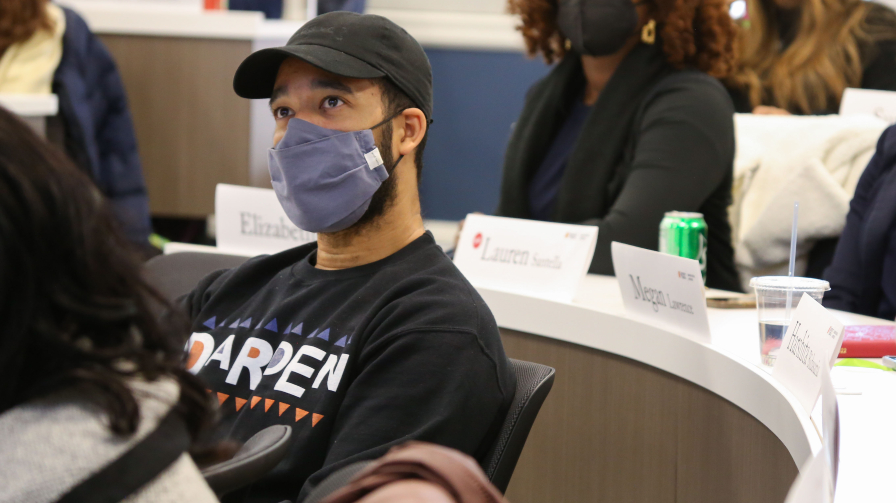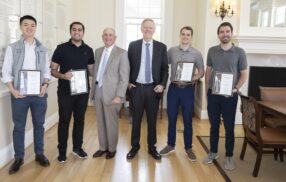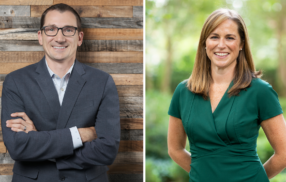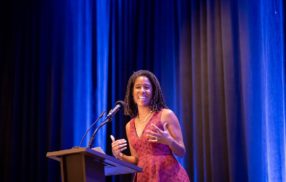
Alumni Panel Considers Wealth Strategies, Definitions at UVA Darden Event
By Dave Hendrick
University of Virginia Darden School of Business students considered strategies for professional development and income growth both in and outside of the confines of a traditional career track at a recent discussion event, with Darden alumni in a variety of fields offering advice and insight for early career professionals.
The event, “Creating Wealth Outside Your Career,” was part of Black Business Experience Month, a monthlong conference sponsored by the Darden Black Business Students Association featuring discussion events, an awards gala, speakers and social celebrations, among other events.
While panelists considered practical tips for wealth creation ranging from maxing out a 401k to real estate investment strategies, Darden alumni encouraged students to step back and consider their life goals and the purpose of personal capital.
“Building wealth is all about how you define wealth,” Blackrock Managing Director Nogie Udevbulu (MBA ’06) said during the event, which was moderated by Darden Professor Rich Evans. “What is wealth to you?”
Rob Archer (MBA ‘94) CEO of the CodeBase Coworking in downtown Charlottesville, encouraged students to be aware of the means and tools they have already accumulated in business school.
“You are very wealthy right now where you sit,” said Archer, noting that his Darden peers remain some of his closest friends and colleagues more than 20 years later. “You have the opportunity to continue to grow and achieve goals.”
When monetary wealth and additional resources do come, view them as “tools to do lots of meaningful things,” said Archer.
Similarly, Alex Picou’s (MBA ‘89) title is managing director of private banking at J.P. Morgan, but said he did not consider the work “wealth management.” Instead, he and his colleagues are in the “life goals business.”
Jullian Harrison, the one non-alumni member on the panel, described his various entrepreneurial pursuits since graduating from college, including starting and serving as COO of a ball bearing company, selling real estate and buying and renovating property with a the goal of combating gentrification. The common thread among his pursuits: spending his time doing work he finds mentally stimulating and enjoyable.
The panelists also offered their top piece of advice before starting a career.
Udevbulu encouraged students to take more organizational behavior classes. A self-described “finance junkie” at Darden, Udevbulu said expertise in interpersonal dynamics would be put to use faster and to greater effect than any suite of technical skills.
Picou, who moved from an investment banking career to private banking, encouraged students to recognize and grow their “transferrable skill set,” noting the inevitable future pivots as they grow a career.
Archer encouraged students to continue to build bridges and network as they graduate and proceed professionally, saying that “relationships are the essence of life” and would benefit them throughout their careers.
Panelists also offered straightforward advice for investing. Udevbulu encouraged students to invest in a 401k retirement account as soon as possible. While it may seem difficult to put away money at a time of looming bills and potential debt, investing early will prove to be one of the easiest and best financial decisions they can make.
“If there is an opportunity to start saving, and it happens before your paycheck hits your bank account — just do it,” she said.
Similarly, Picou encouraged students to figure out how much money they are comfortable investing, and do so. Over a long-term time horizon, simply being “in the market” will prove to be more beneficial than trying to time ups and downs, he said.
Asked how they could think about potentially allocating time for alternative investments or a variety of potential “side hustles” while starting in a career, Udevbulu said she thought the concept of work-life balance was not a particularly helpful consideration; instead, she said, think of the stages of your career as seasons. What season of your career are you in now, she asked? What might you be able to do today that may not be possible at a different season?
There is also a season where you may be particularly inclined to give back, and all the panelists discussed the rewards of volunteer work and mentorship. Picou, who among other roles outside of work serves as chair of the Dean’s Diversity Advisory Council at Darden, said the school ingrained the idea of service into its graduates.
Said Picou, “Giving back, you get as much back as you give.”
The University of Virginia Darden School of Business prepares responsible global leaders through unparalleled transformational learning experiences. Darden’s graduate degree programs (MBA, MSBA and Ph.D.) and Executive Education & Lifelong Learning programs offered by the Darden School Foundation set the stage for a lifetime of career advancement and impact. Darden’s top-ranked faculty, renowned for teaching excellence, inspires and shapes modern business leadership worldwide through research, thought leadership and business publishing. Darden has Grounds in Charlottesville, Virginia, and the Washington, D.C., area and a global community that includes 18,000 alumni in 90 countries. Darden was established in 1955 at the University of Virginia, a top public university founded by Thomas Jefferson in 1819 in Charlottesville, Virginia.
Press Contact
Molly Mitchell
Associate Director of Content Marketing and Social Media
Darden School of Business
University of Virginia
MitchellM@darden.virginia.edu






